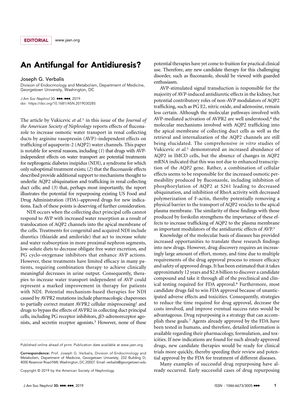An Antifungal for Antidiuresis? Fluconazole's Potential in Treating Nephrogenic Diabetes Insipidus
April 2019
in “
Journal of the American Society of Nephrology
”

TLDR Fluconazole might be a new treatment for a type of diabetes that affects water balance in the body.
The article by Vukicevic et al. discusses the potential of fluconazole, an antifungal drug, to increase water transport in renal collecting ducts independently of arginine vasopressin (AVP), which could be a new treatment for nephrogenic diabetes insipidus (NDI). Current treatments for NDI are suboptimal, and fluconazole's ability to affect the trafficking of aquaporin-2 (AQP2) water channels could represent a significant improvement. The study showed that fluconazole increases the abundance of AQP2 in inner medullary collecting duct (IMCD) cells without affecting AQP2 mRNA, suggesting post-transcriptional mechanisms are at play. The findings support the idea of drug repurposing, which can save time and money in drug development, as fluconazole is already FDA-approved. However, clinical trials are necessary to confirm its efficacy in humans, and potential limitations include its ineffectiveness in NDI caused by AQP2 mutations and the possibility of toxicities with prolonged use.


